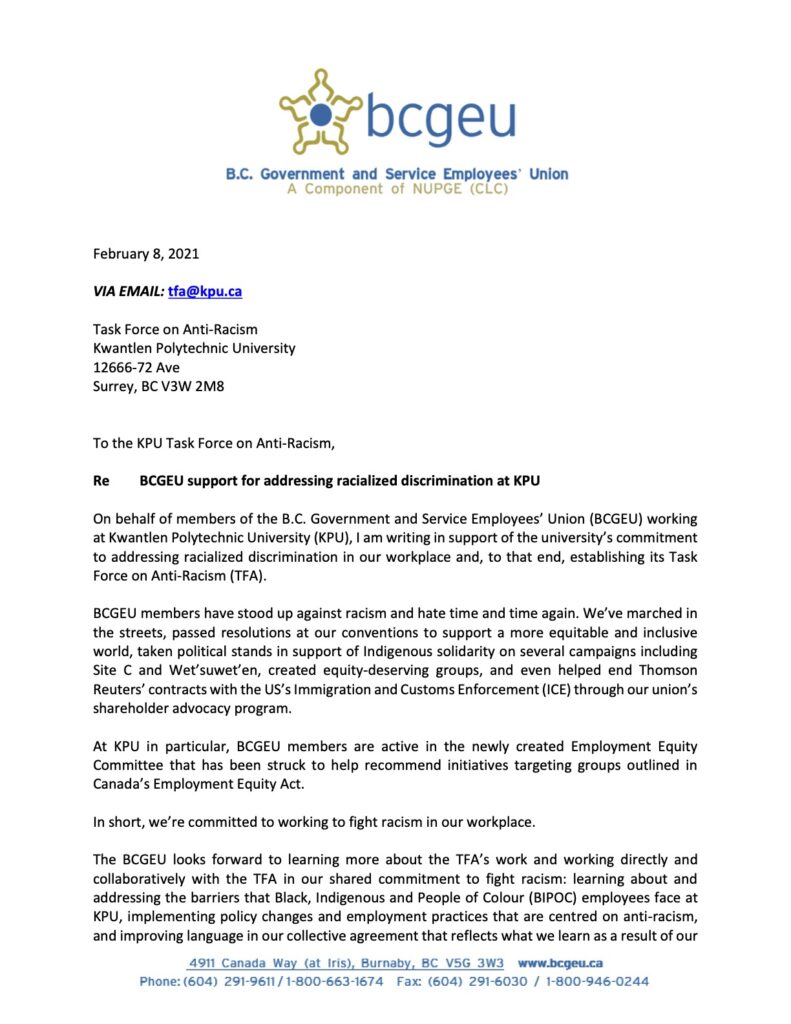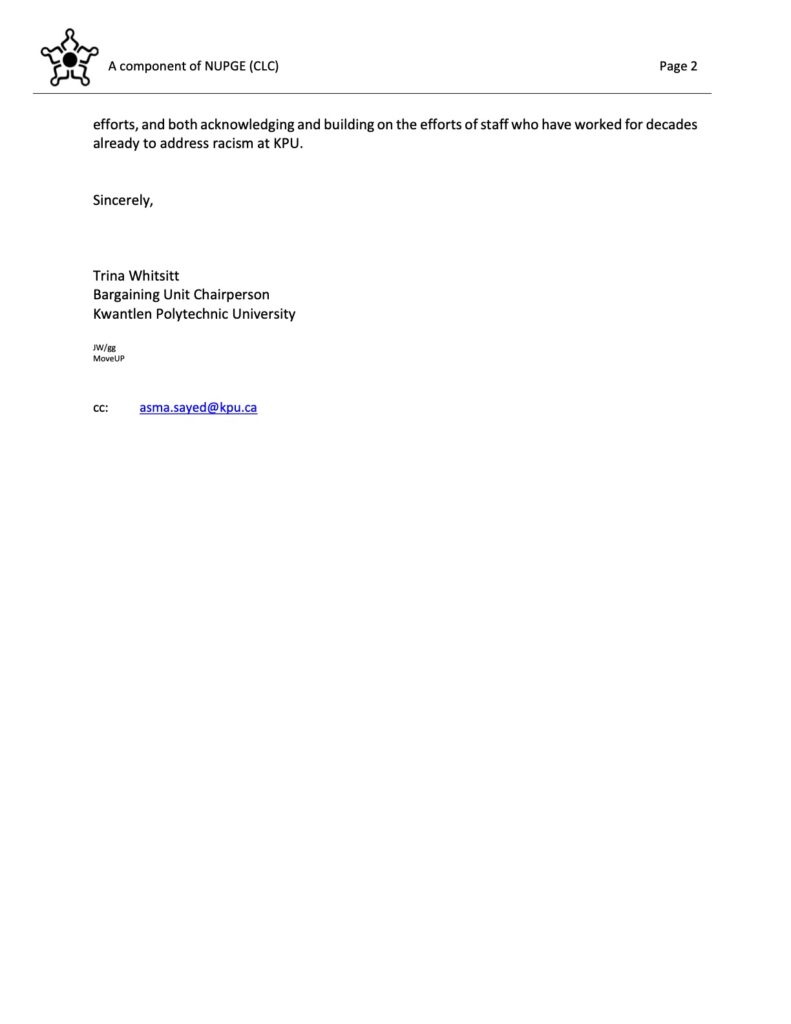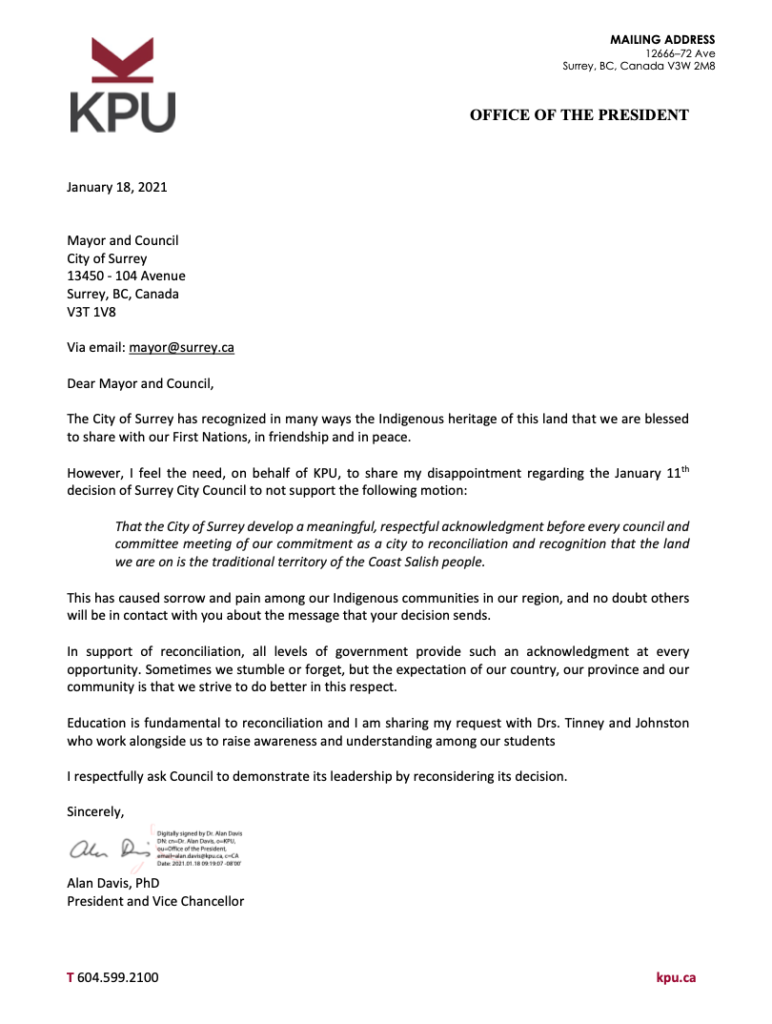The Task Force on Anti-Racism is pleased to share its Final Report and Recommendations.
See the press release about the launch of the report here.
Watch the video of the launch event here.
A cross-institutional initiative at Kwantlen Polytechnic University
The Task Force on Anti-Racism is pleased to share its Final Report and Recommendations.
See the press release about the launch of the report here.
Watch the video of the launch event here.
By Hayley Montes
In order to properly combat racism, we must first understand and recognize the racist tendencies and beliefs that are often hidden within plain sight and embedded within the foundations of our society. Racism is more than just having prejudices against skin colour and hair type; in fact, racism runs so much deeper than what meets the eyes, and it is systemic. The system, including that in Canada and the United States, was created to benefit certain groups. The fight against racism is not only about checking stereotypes and ending bigoted comments, but also about dismantling a system that was created to oppress and marginalize people.
The system that society functions on capitalizes on the notion that someone must always receive the shorter end of the stick and that someone must always end up at the bottom of the food chain. The term “dog eat dog” world had to have come from somewhere, right? One such example of this issue presented is in the article The Italian American Table, where Simone Cinotto notes how upon their arrival to the New York area, Italian immigrants were viewed as lower class and were often criticized for their cultural practices, mainly to do with their diets. However, when Puerto Rican immigrants began to relocate in the New York area, those same Italian immigrants began to “criticize behaviours for which they had been criticized only a few years earlier” (pg. 84, Cinotto). This example displays the flaw in categorizing human beings into distinct boundaries, as these perceptions are arbitrary and subject to change. Placing humans into different categories only creates a divide among them. No one wants to be left behind or be placed at the bottom; in turn, this results in a snowballing effect of racism and discrimination.
All things considered, racism is a difficult topic to navigate. It is one of those topics that people avoid because it can be uncomfortable, but the truth is, we need to have these uncomfortable conversations in order to move forward and be better than those in the past. While racism and discrimination may not be as blatantly in our face in Canada in comparison to some other places in the world, it is still an issue present right here, right now. In fact, the reason why I refuse to turn a blind eye to this difficult topic, or shy away from having difficult conversations, is because I have experienced and witnessed racism and discrimination firsthand, and so have many of my loved ones. It is not enough to be silent and wait for things to get better. In order to combat racism, we must understand and recognize that racism is not an issue of the past. It is present, and unless we continue to have difficult conversations, it will continue to be an issue in the future.
Works Cited
Cinotto, S. (2013). “The Italian American Table: Food, Family, and Community in New York City.” Retrieved from: https://www.jstor.org/stable/10.5406/j.ctt3fh46s
Hayley Montes is a fourth year KPU student majoring in anthropology. In her spare time, she enjoys drawing, baking all sorts of pastries, and reading tarot cards for fun. She is also an avid Canucks fan and hopes to one day become an elementary school teacher. She believes that educating young minds will help aid in creating a better world for all.
Premier John Horgan, Rachna Singh, Parliamentary Secretary for Anti-Racism Initiatives, and Jennifer Whiteside, Minister of Education, have released the following statement in celebration of Black Excellence Day.
KPU’s Task Force on Anti-racism is excited to announce that Kwantlen Polytechnic University (KPU) is one of 40 institutions that have signed the Scarborough Charter on Anti-Black Racism and Black Inclusion in Canadian Higher Education, a national plan of action to fight structural racism. The signing ceremony took place on November 18, 2021.
The charter flows from a year-long collaborative process started during the first National Dialogues and Action for Inclusive Higher Education and Communities in October 2020, a two-day national forum focused on anti-Black racism and Black inclusion in Canadian higher education. KPU President and Vice Chancellor Dr. Alan Davis signed the charter for KPU.
At KPU,
KPU News Release: KPU signs Scarborough Charter to fight structural racism
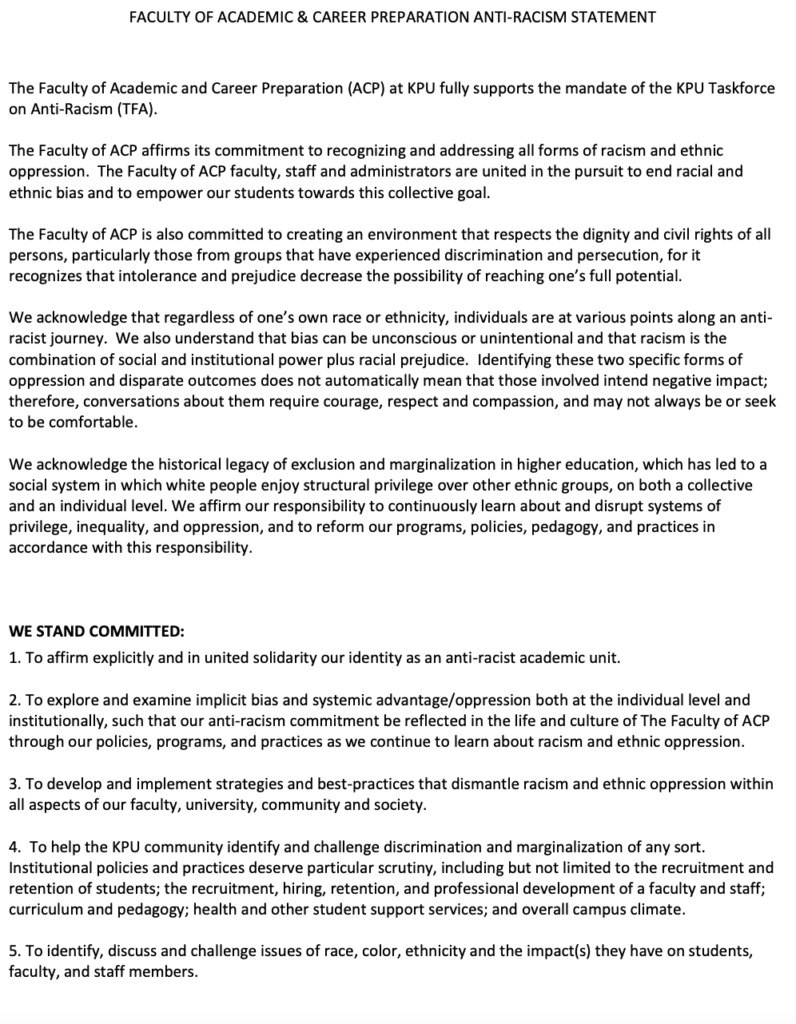
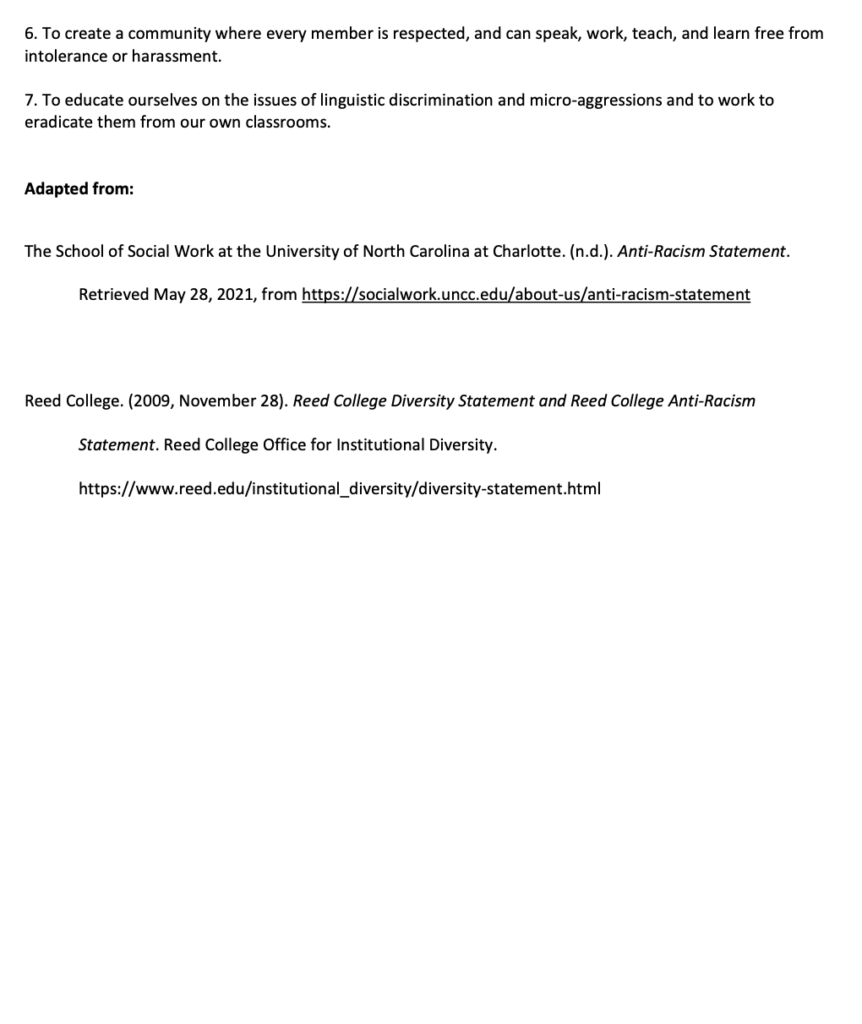
Signatories of the letters below respond to the unmarked graves located at residential schools, commit to individual and collective action, and call upon the Members of the Surrey City Council to revisit and reconsider the January 2021 decision to reject a motion to begin meetings with an Indigenous land acknowledgement.
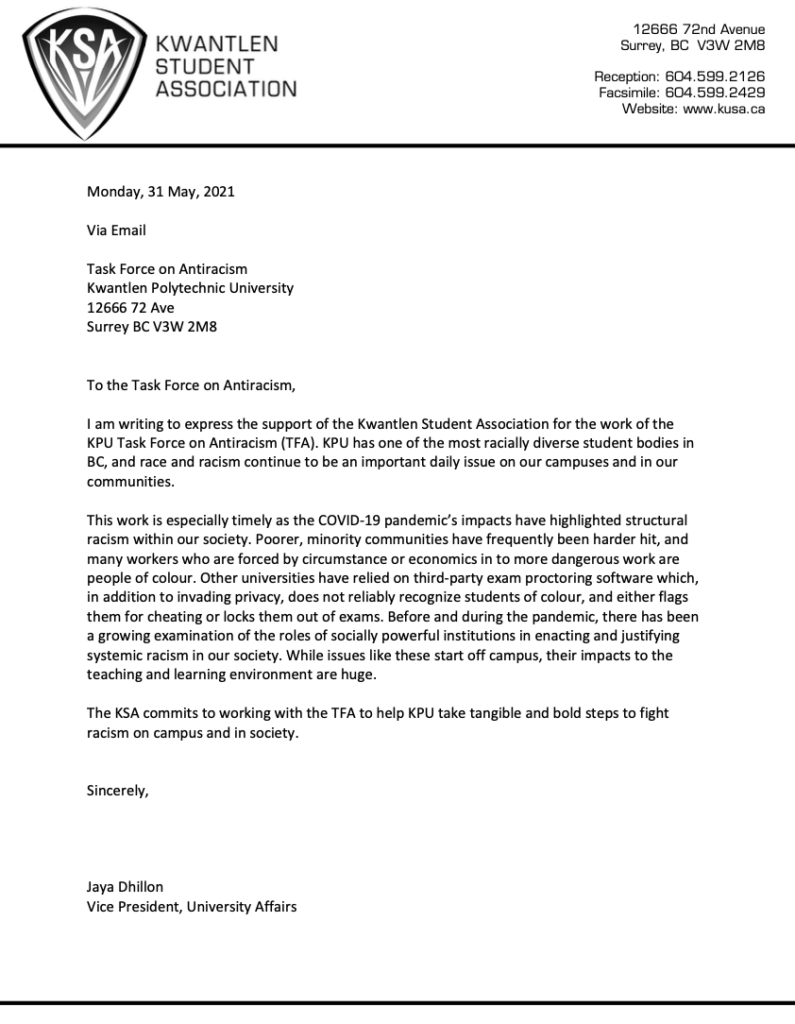
KPU President Alan Davis released the following statement:
Colleagues,
Like you, I have been deeply saddened and appalled by the discovery of the remains of 215 children at the Kamloops Indian Residential School. We stand together with Indigenous community members at Kwantlen Polytechnic University and beyond as we hear of the awful news out of Kamloops.
At Kwantlen Polytechnic University, we work, study, and live in a region south of the Fraser River which overlaps with the traditional and ancestral lands of the hən̓q̓əmin̓əm̓ and SENĆOŦEN speaking peoples, including the Kwantlen who graciously bestowed their name on this university.
We offer our sympathy and solidarity to the Tk’emlúps te Secwépemc, to all those who survived residential schools and to all the Indigenous peoples of Canada.
Today, we have lowered the flags at all our campuses until further notice in honour of every child found buried at Kamloops Indian Residential School. Further, we invite you all to join our colleagues in Teaching and Learning who will be holding a 2 minute 15 second period of silence at 2:15 p.m. today.
On the eve of National Aboriginal History Month, it is important for those of us who are settlers on this land to do more than simply acknowledge the profound loss of life. Dr. Rajiv Jhangiani, Associate Vice President, Teaching and Learning, has recommended reading the 94 Calls to Action of the Truth and Reconciliation Commission of Canada, if you haven’t already, as well as BCcampus’ Pulling Together Guides for Indigenization of Post-Secondary Institutions for instructors, front line staff, or administrators.
Our Indigenous Advisory Committee is meeting tomorrow and we will keep you appraised of any further initiatives arising out of that discussion.
We recognize that the news coming out of Kamloops will be devastating for many and there are resources and supports available to you, including:
Sincerely,
Alan Davis, PhD
President and Vice Chancellor
